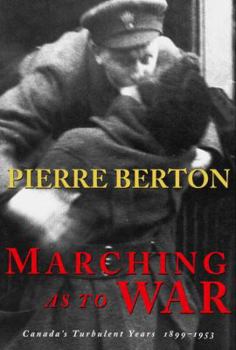Marching as to War: Canada's Turbulent Years
Select Format
Select Condition 
Book Overview
"I have called this period Canada's Turbulent Years - turbulent not only because of the battles we fought on the African veldt, the ravaged meadows of Flanders, the forbidding spine of Italy, and the... This description may be from another edition of this product.
Format:Hardcover
Language:English
ISBN:0385257252
ISBN13:9780385257251
Release Date:August 2001
Publisher:Doubleday Canada
Length:632 Pages
Weight:2.40 lbs.
Dimensions:1.9" x 7.0" x 9.4"
Customer Reviews
2 ratings
Berton is always worth reading
Published by Thriftbooks.com User , 19 years ago
I have read many of Pierre Berton's books, and this one is typical Berton in many ways. He always attempts to take a look at events through a different slant. This book is no different. It both describes Canada's development and maturation of a nation through its participation in four separate international conflicts, and it also uses those conflicts as a measure of the nation itself. The two word wars were the major interest points in this book. Of particular significance is when Berton smashes Canada's storm trooper image in the second world war, that it had acquired in WWI. He effectively discredits both the armed forces and political leadership during WWII, revealling Mackenzie King's once revered "Not necessarily conscription but conscription if necessary" stance as what it truly was, political indecision that resulted in the needless loss of soldier's lives. The book starts and ends slowly, with the chapters on the Boer and Korean wars not being as compelling. Overall, the book is very informative read. It loses a star in that it is not as entertaining or as smooth flowing as some of Berton's previous works, particular his two on the War of 1812 and the Arctic Grail
A Forgotten Aspect of Canadian History
Published by Thriftbooks.com User , 20 years ago
Of course, most Americans dont know much about Canada at all. What we have forgotten is the reputation that Canada had in the early 20th Century as a, believe it or not, military nation. Pierre Berton, the dean of Canadian popular historians (I highly recommend is books on the War of 1812 and the Canadian Pacific Railway) has written a book that, by tracing the way Canada fought and approached the wars it fought in the 20th Century (give or take a couple of years), shows how a raw, immigrant, frontier society, with significant social and ethnic divisions, can come to maturity and take a constructive place in world affairs.The story starts with the Boer War, and English Canada's enthusiam for the empire, when Sir Wilfred Laurier could say that Canada stands "ready, aye ready" to play its role in defending the empire. It leads to a lot of young men getting killed and tension between English and French-speaking Canada. Quebec is far less excited about sending young men to die for the empire it seems than the rest of Canada. The Boer war leads to some questioning of war and support of the empire, but not much, paving the way for Canada's participation in World War I.This was a much greater question and a larger commitment by the nation. Canada, Australia and New Zealand quickly joined in the war against Germany, and began to organize armies and send troops to Europe almost immediately. The extent of Canadian (and Australian) participation in the war is one of the forgotten aspects, at least in the U.S. Canadian troops quickly gained a fearsome reputation on the Western Front, and by 1918 were, along with the Australians, considered the shocktroops of the British Army. If an offensive were being planned, you could be sure that the Canadians and the Australians would be used. Vimy Ridge and Amiens were only two of the places that Berton writes about.The cost was high, however. As manpower in the Canadian corps began to run short the Borden government introduced conscription, which inflammed the French/English split, as well as alienating some of the farm communities in western Canada. The effects would be felt in World War II. Canada was also an early participant in this war, in support of Great Britain. An army was raised to fight in Europe (seeing action in Italy and France). But the Mackenzie King government steadfastly refused to adopt conscription, even to the point of seeing their military contribution to the allies decay. A tension between Canadian militance and willingness to participate in war, and the needs of preserving the unity of the country was apparent, and grew even larger as a result of participation in the last great war of the 20th C, in Korea.What the Canadians pioneered as a result of this history, is a national commitment to peacekeeping and support of the UN. Lester Pearson made his reputation during the Suez crisis as a peacekeeper, a commitment Canada keeps to this day. Its important to note on the 10th anniversary of the geno





